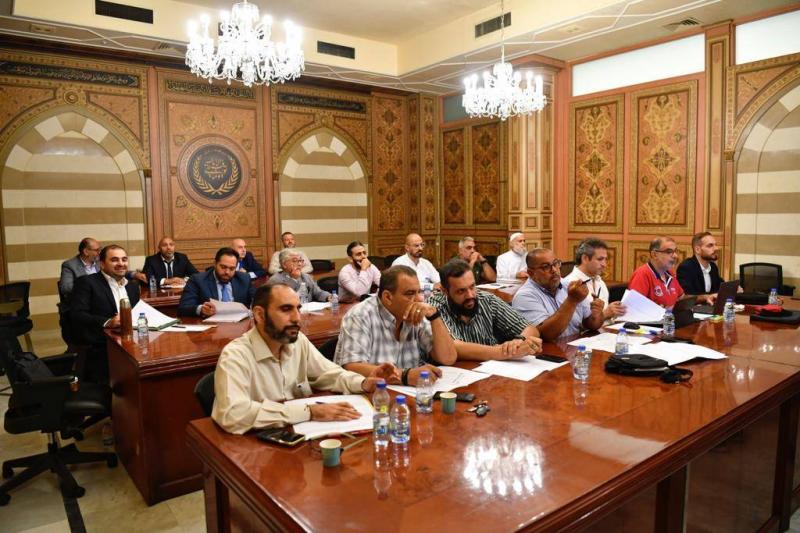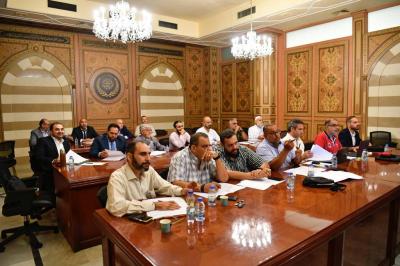The Grand Mufti of the Lebanese Republic, Sheikh Abdul Latif Derian, has endorsed the results of the elections for the Higher Islamic Shari'a Council, which took place in Beirut and various Lebanese regions. The elected officials for the Beirut Governorate include: Mohammed Makawi, Waseem Al-Maghrabi, Ziad Al-Sahib, Abdul Hamid Al-Taqi, Mazen Sharbaghi, Talal Baydoun, Abdullah Shahin, and Fouad Zarad. In the North Governorate, the winners are: Faiz Mustafa Saif, Bilal Barakah, Ahmad Abdul Amin, Mazher Al-Hamawi, Osama Tarad, Munther Hamza, and Wael Zomrali. In Akkar Governorate, Kifah Al-Kassar was elected. In Mount Lebanon, Raif Abdullah and Hamza Sharaf Al-Din were successful. In Beqaa, the winners are: Mohammed Al-Ajami and Younes Abdul Razzaq. In Sidon District, the winners by acclaim are: Abdul Halim Al-Zein, Mowafaq Al-Rawas, and Faiz Ba'aser. In the districts of Hasbaya and Marjayoun, Nazeer Hamad was also elected by acclaim.
The voting process in Beirut began after confirming the legal quorum by the representative of the Grand Mufti of the Lebanese Republic, Judge Iyad Bardan, with the assistance of the Director General of Islamic Endowments, Sheikh Mohammed Anis Al-Arawadi. The election process for the eight council members from Beirut commenced accordingly. The election was attended by the electoral body including Mufti Derian, former Prime Ministers Tammam Salam and Hassan Diab, Minister of Health Firas Al-Abyad, Minister of Economy Amin Salam, MPs Fouad Makhzoumi, Nabil Badr, Emad Al-Hout, Adnan Traboulsi, Wadhah Sadaq, Ibrahim Mneimneh, Secretary General of the Cabinet Mahmoud Makieh, members of the Higher Islamic Shari'a Council, the mufti's secretary, muftis, judges, board members of Islamic endowments, the Director General of Endowments, Secretary General of the Shari'a Council, imams, contract and appointed clerics, and Sunni judiciary officials.
After Mufti Derian initiated the voting process and cast his ballot, he stated: "Conducting elections for the Higher Islamic Shari'a Council is an implementation of the applicable laws as outlined in Legislative Decree No. 18 and its amendments. These elections that took place across all Lebanese governorates reaffirm that we are committed to the systems and laws, eager to elevate our institutions, which are an integral part of the general system of the Lebanese state." He noted that "the elections were conducted in transparency and peace, with mutual respect among all candidates. We hope that those who won seats in the Shari'a Council will work together to serve the Islamic community in particular and Lebanon in general, ensuring transparency and competition in public service."
Derian emphasized that "the Dar Al-Fatwa is an inclusive house that embraces all scholars and those working within the religious institution, aside from its national responsibilities. It will remain a center for moderation, openness, and a commitment to the unity of Muslims and all Lebanese."
Former Prime Minister Tammam Salam, after casting his vote, when asked about calls to separate politics from the elections of the Shari'a Council, said: "I see no politics today; I see a good Shari'a Council election. Of course, there are some politicians due to the system and the law, but this atmosphere, as we all follow, has nothing to do with politics whatsoever."
The vote counting process in the elections for the Higher Islamic Shari'a Council in Mount Lebanon concluded at the Dar Al-Fatwa in the Jieh area, under the supervision of the representative of Mufti Derian, Sheikh Mohammed Ali Al-Jouzou, and the head of the electoral center for Mount Lebanon, attorney Mowafaq Al-Rawas, assisted by the head of the Endowments Department in Mount Lebanon, attorney Mohammed Al-Khatib. The winners were Judge Hamza Awad Sharaf Al-Din with 71 votes and Shari'a Judge Sheikh Rief Younes Abdullah with 61 votes. The number of voters was 107 out of an electoral body of 122, with 15 absent. The third candidate, Sheikh Aatif Qashou, unfortunately gathered only 47 votes. Following the results, Sharaf Al-Din and Abdullah received congratulations for their election.
The number of voters in Mount Lebanon was 107 out of 122, and the voting process was carried out peacefully amidst a climate of harmony welcoming to democratic electoral proceedings.
Sheikh Al-Jouzou congratulated the winners, expressing hopes for improved conditions and highlighting the role of the Dar Al-Fatwa in the region, stating, "We established a vocational school and Islamic institutions to teach the Holy Quran, which the region lacks, to maintain the Islamic identity in Jebel Qroub." He hoped that "the elections for the Higher Islamic Shari'a Council would lead to an Islamic project that advances Muslims and addresses their issues, reflecting this community's need for unity and collective aspirations, not just an institution for history's sake."
In Tripoli, the vote counting for the elections of the Higher Islamic Shari'a Council resulted in the following winners: Faiz Saif with 99 votes, Bilal Baraka with 81 votes, Ahmad Al-Amin with 74 votes, Mazher Al-Hamawi with 71 votes, Osama Tarad with 65 votes, Wael Zomrali with 60 votes, and Munther Hamza with 60 votes. The election to select 7 members of the Higher Islamic Shari'a Council was delayed from the scheduled start time of 9 a.m. due to a lack of legal quorum, needing two-thirds of the electoral body’s 134 members to be present.
Several members of the electoral body and candidates gathered at the Dar Al-Fatwa, waiting for attendance to reach 67, the required quorum for the second phase of the electoral process. Nineteen candidates competed in this election, with 7 on a complete list, while 12 candidates opted to run individually without lists or alliances. According to the General Directorate of Endowments, the voting closed at 1 p.m., followed by the counting and announcement of results.
The Minister of Interior and Municipalities in the caretaker government, Bassam Mawlawi, cast his vote in Tripoli, stating: "Today, in the week of the anniversary of the Prophet Muhammad's birth, Lebanon and various Lebanese regions witness the election of the Higher Islamic Shari'a Council. This council plays a significant role in the Sunni community, which has contributed to and increasingly emphasizes the unity of Lebanon, offering a good model through the virtue of its citizens in nationalism and culture to ensure Lebanon advances." He added, "The Higher Islamic Council has a significant role in protecting endowment properties and citizens' rights, contributing to matters of national relevance that lead to the unity of Lebanon."
MP Ashraf Rifi also cast his vote in Tripoli, stating: "Our vote is for whom we see as best representing Tripoli and the surrounding areas, including Minyeh, Dinniyeh, and Koura. Therefore, we did not accept having predetermined names or lists imposed on the electoral body; we insisted on allowing the educated electoral body to choose the best candidate."




